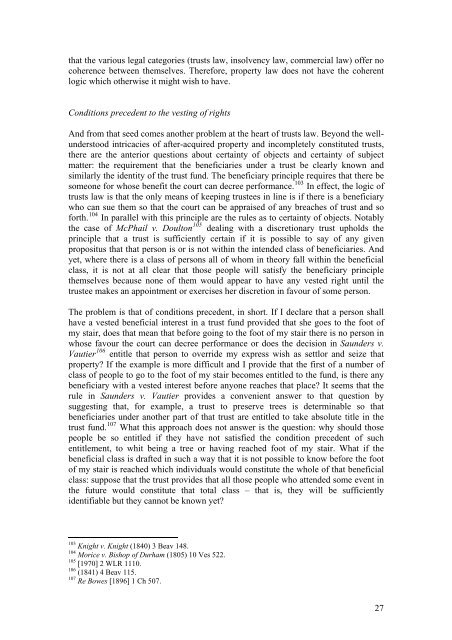The Unbearable Lightness of Property - alastairhudson.com
The Unbearable Lightness of Property - alastairhudson.com
The Unbearable Lightness of Property - alastairhudson.com
You also want an ePaper? Increase the reach of your titles
YUMPU automatically turns print PDFs into web optimized ePapers that Google loves.
that the various legal categories (trusts law, insolvency law, <strong>com</strong>mercial law) <strong>of</strong>fer no<br />
coherence between themselves. <strong>The</strong>refore, property law does not have the coherent<br />
logic which otherwise it might wish to have.<br />
Conditions precedent to the vesting <strong>of</strong> rights<br />
And from that seed <strong>com</strong>es another problem at the heart <strong>of</strong> trusts law. Beyond the wellunderstood<br />
intricacies <strong>of</strong> after-acquired property and in<strong>com</strong>pletely constituted trusts,<br />
there are the anterior questions about certainty <strong>of</strong> objects and certainty <strong>of</strong> subject<br />
matter: the requirement that the beneficiaries under a trust be clearly known and<br />
similarly the identity <strong>of</strong> the trust fund. <strong>The</strong> beneficiary principle requires that there be<br />
someone for whose benefit the court can decree performance. 103 In effect, the logic <strong>of</strong><br />
trusts law is that the only means <strong>of</strong> keeping trustees in line is if there is a beneficiary<br />
who can sue them so that the court can be appraised <strong>of</strong> any breaches <strong>of</strong> trust and so<br />
forth. 104 In parallel with this principle are the rules as to certainty <strong>of</strong> objects. Notably<br />
the case <strong>of</strong> McPhail v. Doulton 105 dealing with a discretionary trust upholds the<br />
principle that a trust is sufficiently certain if it is possible to say <strong>of</strong> any given<br />
propositus that that person is or is not within the intended class <strong>of</strong> beneficiaries. And<br />
yet, where there is a class <strong>of</strong> persons all <strong>of</strong> whom in theory fall within the beneficial<br />
class, it is not at all clear that those people will satisfy the beneficiary principle<br />
themselves because none <strong>of</strong> them would appear to have any vested right until the<br />
trustee makes an appointment or exercises her discretion in favour <strong>of</strong> some person.<br />
<strong>The</strong> problem is that <strong>of</strong> conditions precedent, in short. If I declare that a person shall<br />
have a vested beneficial interest in a trust fund provided that she goes to the foot <strong>of</strong><br />
my stair, does that mean that before going to the foot <strong>of</strong> my stair there is no person in<br />
whose favour the court can decree performance or does the decision in Saunders v.<br />
Vautier 106 entitle that person to override my express wish as settlor and seize that<br />
property If the example is more difficult and I provide that the first <strong>of</strong> a number <strong>of</strong><br />
class <strong>of</strong> people to go to the foot <strong>of</strong> my stair be<strong>com</strong>es entitled to the fund, is there any<br />
beneficiary with a vested interest before anyone reaches that place It seems that the<br />
rule in Saunders v. Vautier provides a convenient answer to that question by<br />
suggesting that, for example, a trust to preserve trees is determinable so that<br />
beneficiaries under another part <strong>of</strong> that trust are entitled to take absolute title in the<br />
trust fund. 107 What this approach does not answer is the question: why should those<br />
people be so entitled if they have not satisfied the condition precedent <strong>of</strong> such<br />
entitlement, to whit being a tree or having reached foot <strong>of</strong> my stair. What if the<br />
beneficial class is drafted in such a way that it is not possible to know before the foot<br />
<strong>of</strong> my stair is reached which individuals would constitute the whole <strong>of</strong> that beneficial<br />
class: suppose that the trust provides that all those people who attended some event in<br />
the future would constitute that total class – that is, they will be sufficiently<br />
identifiable but they cannot be known yet<br />
103 Knight v. Knight (1840) 3 Beav 148.<br />
104 Morice v. Bishop <strong>of</strong> Durham (1805) 10 Ves 522.<br />
105 [1970] 2 WLR 1110.<br />
106 (1841) 4 Beav 115.<br />
107 Re Bowes [1896] 1 Ch 507.<br />
27













